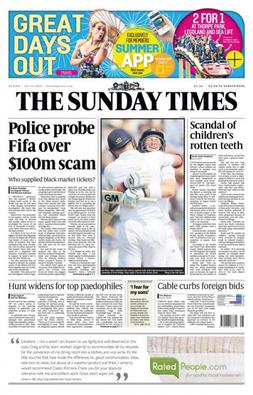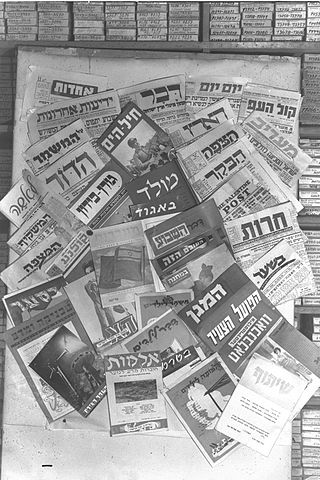
The Times is a British daily national newspaper based in London. It began in 1785 under the title The Daily Universal Register, adopting its modern name on 1 January 1788. The Times and its sister paper The Sunday Times are published by Times Media, since 1981 a subsidiary of News UK, in turn wholly owned by News Corp. The Times and The Sunday Times, which do not share editorial staff, were founded independently and have had common ownership only since 1966. In general, the political position of The Times is considered to be centre-right.
In Ireland, the state retains laws that allow for censorship, including specific laws covering films, advertisements, newspapers and magazines, as well as terrorism and pornography, among others. In the early years of the state, censorship was more widely enforced, particularly in areas that were perceived to be in contradiction of Catholic dogma, including abortion, sexuality and homosexuality. The church had banned many books and theories for centuries, listed in the Index Librorum Prohibitorum.

The Sunday Times is a British Sunday newspaper whose circulation makes it the largest in Britain's quality press market category. It was founded in 1821 as The New Observer. It is published by Times Newspapers Ltd, a subsidiary of News UK, which is owned by News Corp. Times Newspapers also publishes The Times. The two papers, founded separately and independently, have been under the same ownership since 1966. They were bought by News International in 1981.
Kenneth Vincent Zinck is a former Fijian trade unionist, politician and Cabinet Minister, who served as Minister of Labour in the government of Laisenia Qarase from 2001 to 2006. In the aftermath of the 2006 Fijian coup d'état he sought political asylum in Australia.
The Fiji's Daily Post (FDP) was a newspaper in Fiji that was founded in October 1987 by Wame Waqanisanini, Jr, who owned 50 percent of the shares. Taniela Bolea was the original publisher. The majority shares were later owned by the Fijian government. The newspaper suspended publication and has remain closed since 2010.

Fiji Sun is a daily newspaper published in Fiji since September 1999 and owned by Sun News Limited. Fiji Sun was founded by and is part of CJ Patel Group.

The Myanmar Times, founded in 2000, is the oldest privately owned and operated English-language newspaper in Myanmar. A division of Myanmar Consolidated Media Co., Ltd. (MCM), The Myanmar Times published weekly English and Burmese-language news journals until March 2015, when the English edition began publishing daily, five days per week. Its head offices are in Yangon, with additional offices in Mandalay and Nay Pyi Taw. As the announcement shown in the official website of this newspaper, it has stopped nine media services on 21 February 2021 primarily for three months. However, its services are still suspended till now.

The Israeli Military Censor is a unit in the IDF Directorate of Military Intelligence tasked with carrying out preventive censorship inside the State of Israel regarding the publication of information that might affect the security of Israel. The body is headed by the Israeli Chief Censor, a military official is appointed by Israel's Minister of Defense, who bestows upon the Chief Censor the authority to suppress information he deems compromising from being made public in the media. On average, 2240 press articles in Israel are censored by the Israeli Military Censor each year, approximately 240 of which in full, and around 2000 partially.
Fiji Samachar was a Hindi language newspaper published in Fiji from 1924 to 1974. It was published in Suva by the Indian Printing and Publishing Company and its first editor was Babu Ram Singh.

Virisila Buadromo is a Fijian political activist and former journalist, who was the executive director of the Fiji Women's Rights Movement (FWRM) from 2001 to 2015. She used to be the news director for FM96.
Censorship in Myanmar results from government policies in controlling and regulating certain information, particularly on religious, ethnic, political, and moral grounds.
Attar Singh is an Indo-Fijian trade unionist. From 2002 to 2018 he was General Secretary of the Fiji Islands Council of Trade Unions (FICTU), one of two major umbrella bodies for trade unions in Fiji.

There are over ten different languages in the Israeli media, with Hebrew as the predominant one. Press in Arabic caters to the Arab citizens of Israel, with readers from areas including those governed by the Palestinian National Authority. During the eighties and nineties, the Israeli press underwent a process of significant change as the media gradually came to be controlled by a limited number of organizations, whereas the papers published by political parties began to disappear. Today, three large, privately owned conglomerates based in Tel Aviv dominate the mass media in Israel.
Censorship is a long term issue in Malaysia which has become more apparent as it attempts to adapt to a modern knowledge-based economy. Despite having in its Federal Constitution that subject to certain conditions, "every citizen has the right to freedom of speech and expression", Malaysia has consistently sat low on global indexes related to press and media freedom.
Censorship in Israel is officially carried out by the Israeli Military Censor, a unit in the Israeli government officially tasked with carrying out preventive censorship regarding the publication of information that might affect the security of Israel. The body is headed by the Israeli Chief Censor, a military official appointed by Israel's Minister of Defense, who bestows upon the Chief Censor the authority to suppress information he deems compromising from being made public in the media, such as Israel's nuclear weapons program and Israel's military operations outside its borders. On average, 2240 press articles in Israel are censored by the Israeli Military Censor each year, approximately 240 of which in full, and around 2000 partially.
Shanti Dut is a Hindi language newspaper published weekly in Suva, Fiji and is owned by Mahendra Motibhai Patel. It is one of the oldest non-English language newspapers owned by the corporation having started in 1935. Its first editor and founder was Pundit Guru Dayal Sharma MBE, JP and Author of "Memories of Fiji 1887 to 1987.
The print, broadcast and online mass media in Burma has undergone strict censorship and regulation since the 1962 Burmese coup d'état. The constitution provides for freedom of speech and the press; however, the government prohibits the exercise of these rights in practice. Reporters Without Borders ranked Burma 174th out of 178 in its 2010 Press Freedom Index, ahead of just Iran, Turkmenistan, North Korea, and Eritrea. In 2015, Burma moved up to 144th place, ahead of many of its ASEAN neighbours such as Singapore, as a result of political changes in the country.
Censorship in New Zealand has been present since around 1850 and is currently managed by the Classification Office under the Films, Videos, and Publications Classification Act 1993.
In April 2009, Fiji underwent a constitutional crisis when the Court of Appeal ruled that the 2006 Fijian coup d'état had been illegal. The Court dismissed the Interim Cabinet led by Prime Minister Frank Bainimarama that had governed Fiji since the coup. However, President Josefa Iloilo announced on a nationwide radio broadcast that he was abrogating the Constitution. He dismissed all judges and constitutional appointees, and reinstated Bainimarama and his cabinet. He also instituted emergency rule which increased police powers and allowed media censorship.
Censorship in Indonesia has varied since the country declared its independence in 1945. For most of its history the government of Indonesia has not fully allowed free speech and has censored Western movies, books,films, and music as well. However, partly due to the weakness of the state and cultural factors, it has never been a country with full censorship where no critical voices were able to be printed or voiced.







